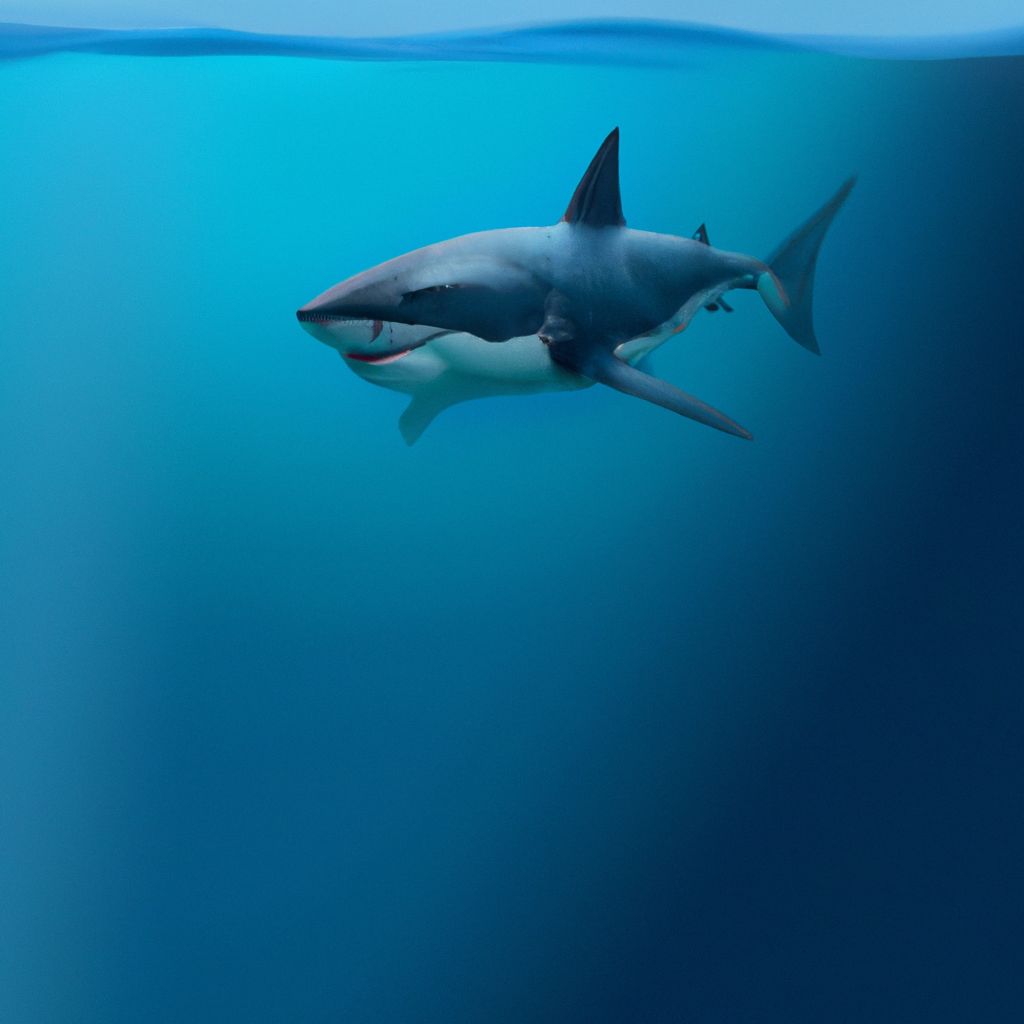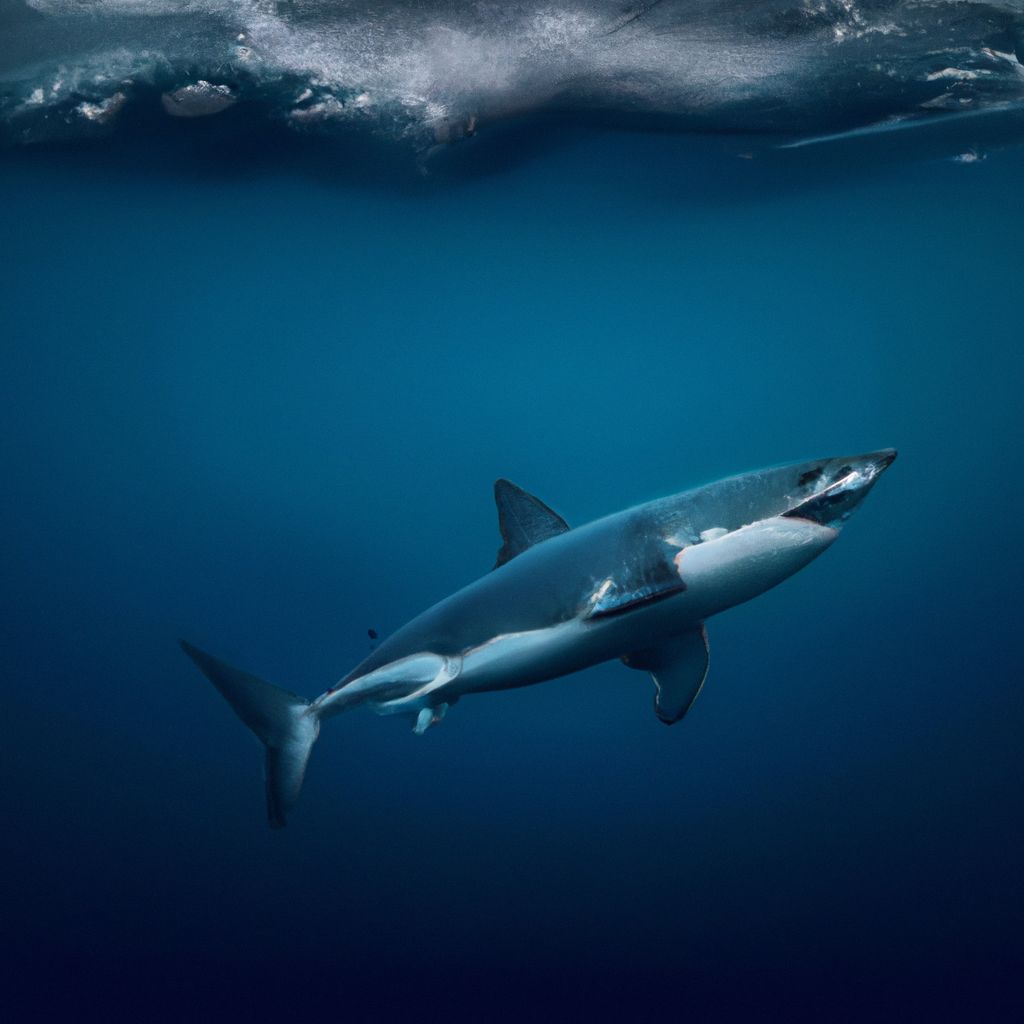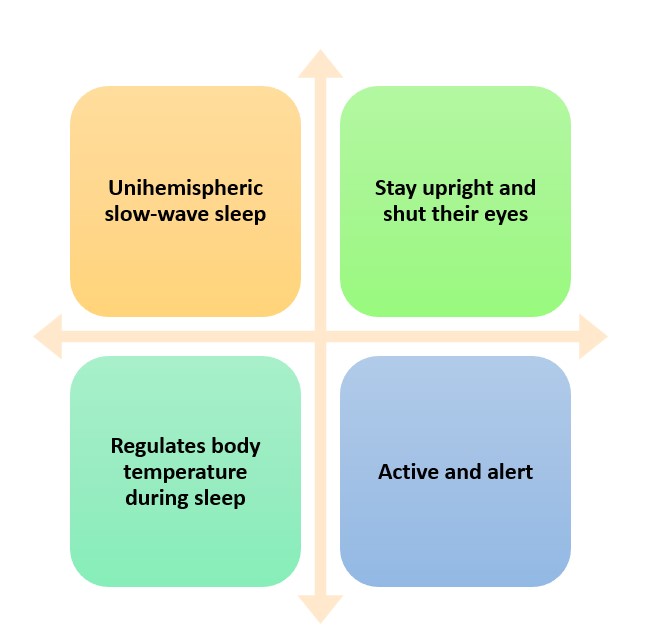
Do these apex predators of the oceans, Great White Sharks, sleep? Yes, they do, but differently than us humans.
Rather than deep sleep cycles, they experience something called “unihemispheric slow-wave sleep.” Only one half of their brain is asleep while the other remains awake and vigilant. This allows them to swim and stay alert to potential threats or prey.
Surprisingly, research shows these sharks need less sleep than other species. But, more research is needed to learn more about their sleeping patterns.
Anecdotes reveal even more about their sleep. In 1963, a group of fishermen caught a shark off Montauk Point in New York. The shark went limp when brought onto the boat – seemingly unconscious. Tapping lightly on its snout caused it to swim away unharmed!
It’s clear that Great White Sharks possess a unique and fascinating way of resting.
Key Takeaways
- Great white sharks do sleep, but in a different way than humans. They have periods of rest where they slow down their activity and become less responsive.
- During these resting periods, great white sharks continue to swim slowly to maintain oxygen flow over their gills.
- It is believed that great white sharks have the ability to shut down parts of their brain while resting, allowing them to conserve energy.
- The exact sleep patterns of great white sharks are still not fully understood, and more research is needed to determine the extent of their sleep behavior.
- Understanding the sleep patterns of great white sharks is important for conservation efforts and ensuring their well-being in captivity.
Definition of Great White Sharks

The mighty Great White Shark, or Carcharodon carcharias, is an intimidating giant of the ocean. They can grow up to 20 feet long and weigh 5,000 pounds. Their white underbelly and powerful form instill fear in both prey and humans.
These predators are equipped with sharp teeth and massive bite force – up to 4,000 pounds per square inch. This enables them to snag seals, sea lions, and even other sharks. Great whites can move fast too, reaching speeds of 25 miles per hour.
Their impressive ability to breach the surface is a reminder of their adaptability as hunters. The sharks possess a unique sensing organ called the ampullae of Lorenzini. This detect electromagnetic fields from their food. So, they can find prey even in murky waters.
Moreover, according to National Geographic, great whites can stay semi-conscious and still be active. This raises the question: do they really sleep? Scientists still haven’t found an answer, but it looks like these majestic creatures may not sleep like us humans.
General Sleep Patterns in Sharks

Sharks have unique sleeping patterns that are different from other animals. They can still be conscious while cycling between rest and activity. This is called unihemispheric slow-wave sleep, where only one half of their brain sleeps.
While resting, they swim slowly, stay upright and shut their eyes. However, their brain is still active enough to sense threats or prey nearby. This helps them rest but still remain alert.
Some species of sharks also have quick bursts of activity for short periods during the day and night. This helps maintain blood circulation and oxygen supply to vital organs.
It’s fascinating that Great White Sharks can regulate their body temperature while asleep. It stays slightly higher than the surrounding water temperature – a physiological adaptation that keeps metabolism levels optimal during rest.
Stanford University’s Hopkins Marine Station researched migratory patterns of great white sharks. It was discovered that they travel thousands of miles across oceans for feeding and mating. Showcasing remarkable navigation skills.
Research on Great White Shark Sleep
Great White Sharks don’t sleep! Instead, they exhibit periods of restful inactivity, reducing their swimming and hovering in the water column. This is known as unihemispheric sleep, where one half of the brain remains alert while the other shuts down. This clever adaptation ensures their survival in the ocean.
In one remarkable instance, researchers observed a Great White Shark swimming normally during the day then suddenly becoming motionless near a reef all through the night. This demonstrates their unique sleep behavior.
The research continues to fascinate scientists and uncover more secrets about these mysterious creatures.
Current Theories on Great White Shark Sleep
The Great White Shark – a fearsome ocean predator that has captivated scientists for years – has kept its sleeping habits a mystery. Theories suggest that it experiences Unihemispheric Slow-Wave Sleep, where half of the brain remains awake, or a period of reduced activity to conserve energy.
Recent research has revealed that when in a resting state, Great Whites swim slower and become less active, conserving energy by gliding through the water. This could be a form of sleep. But more studies are needed to confirm this.
Its cartilaginous structure and large body mass give it positive buoyancy, allowing it to stay afloat during rest. Technology provides insights into their routines, with tracking devices and video cameras capturing data on movements and behaviour. Scientists are now piecing together the puzzle of how these majestic creatures rest.
Implications of Great White Shark Sleep Patterns
The Great White Shark is an awe-inspiring creature and their sleep patterns have far reaching implications. Researchers are gaining insight into their hunting strategies, migration patterns and survival.
Among the remarkable things about them is their ability to engage in unihemispheric slow-wave sleep. During this state, only half of their brain remains awake allowing them to keep swimming and maintain oxygen flow.
Moreover, they prefer shallow waters when in this state, enabling them to remain close to the surface and regulate their body temperatures.
In addition, they also engage in shorter periods of deep sleep where both halves of their brains are asleep. This provides crucial restorative opportunities before they resume hunting.
It’s important to remember not to disturb sleeping great whites as this will disrupt their restorative processes. Observing their sleep patterns is a critical part of conservation efforts to ensure the long-term survival of these magnificent creatures.
Conservation and Research Efforts
Conservation and research efforts are key for protecting marine ecosystems and their amazing inhabitants. By understanding species’ behaviors and needs, scientists can form strategies to conserve them. Let’s take a closer look at these noteworthy efforts.
Citizen Science Initiatives engage volunteers in collecting data about shark sightings, migration patterns, and behavior. Tracking Technologies use satellite tags, acoustic transmitters, and drones to monitor great white sharks’ movements, feeding habits, and breeding grounds. Collaborative Research Projects bring scientists from different organizations and countries together to share resources and knowledge.
Through these efforts, we now know more about these apex predators! Citizen Science Initiatives help the public share observations about their behavior. Tracking Technologies record real-time data on their movements. Collaborative Research Projects yield greater insight into their biology and ecological importance.
We can support conservation efforts for Great White Sharks by establishing Marine Protected Areas (MPAs), promoting education and awareness, and implementing sustainable fishing practices. MPAs create safe havens for them to recover and thrive. Education and awareness dispel misconceptions and foster stewardship. Sustainable fishing methods protect the sharks and the entire marine food chain.
Sleep or no sleep, one thing’s for sure – Great White Sharks are always ready for a bite to eat!
Frequently Asked Questions
Do Great White Sharks Sleep?
Yes, great white sharks do sleep. However, their sleep patterns are quite different from humans.
1. How do great white sharks sleep?
Great white sharks practice a method of sleep known as “unihemispheric slow-wave sleep.” This means that only one half of their brain sleeps at a time, while the other remains awake and alert.
2. Why do they sleep this way?
This unique sleep pattern allows great white sharks to keep their essential functions running even while they rest. It helps maintain their ability to breathe, stay alert to potential dangers, and continue swimming to ensure oxygen flow over their gills.
3. How long do great white sharks sleep?
The sleep duration of great white sharks can vary, but on average, they may sleep for several hours a day.
4. Where do they sleep?
Great white sharks usually sleep close to the water’s surface, often near the seafloor or alongside a reef. They also tend to seek out quieter, more protected areas to rest.
5. Do great white sharks sleep at night?
While great white sharks have been observed sleeping during the day, they are primarily nocturnal predators, so they may be more active during nighttime hunting hours.
6. Can humans approach a sleeping great white shark?
It is strongly advised not to approach a great white shark, whether it is sleeping or awake. Even during sleep, a shark’s senses remain active, and any sudden disturbance could trigger a defensive response.
Conclusion
Great white sharks have long been thought to not sleep, but recent research suggests otherwise. They enter a rest state, not quite the same as the deep sleep humans experience. Amazingly, these apex predators can detect the electromagnetic fields of potential prey, even from afar.
Researchers studying these sharks off South Africa’s coast noticed one swimming in what seemed like random patterns for several hours at night. Later, they realized it was hunting seals returning from their nocturnal feeding. This reveals how great white sharks hunt with precision.



